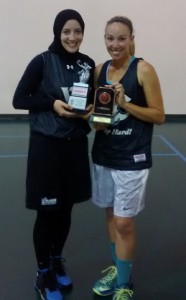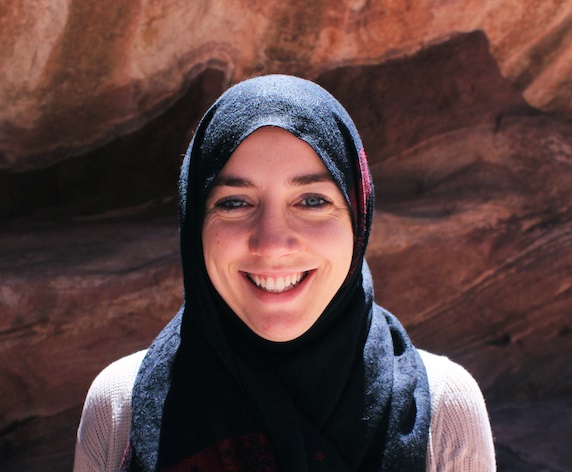By Hyacinth Mascarenhas
What would you do if you were forced to choose between your dream and your faith?
Formerly a high school star in Van Nuys, Calif., a JUCO All-American at Ventura College and an award-winning contributor at Tulane University, Bosnian native and California-resident Indira Kaljo played professional basketball for two years in Europe and is currently seeking a contract there.
Raised Muslim in a Bosnian-American family, Kaljo made the decision to wear a hijab earlier this year. Now, that decision could hinder and possibly halt her professional basketball career.
“It’s a big step to do that [wear a hijab] and I wanted to check to see if FIBA had any rules against covering, and lo and behold, of course they do,” said Kaljo.
Article 4.4.2 of FIBA’s rules states: “Players shall not wear equipment (objects) that may cause injury to other players. Headgear, hair accessories and jewelry are not permitted.” The most commonly cited reasons for the rules are safety, uniformity and religious neutrality issues.
“Personally, it’s heartbreaking not just for me,” said Kaljo. “There are so many players in the world practicing different religions, covering for whatever reason and they can’t play their sport. To tell somebody that this opportunity is taken away from you because of what you wear on your head…I just don’t understand it.”
Kaljo recently launched a Change.org petition asking the Switzerland-based International Basketball Federation (FIBA) to change its rule banning female athletes from wearing “headgear,” including Islamic head scarves or hijabs. She believes the FIBA policy is costing her and many others employment opportunities and the chance to potentially represent and play for their national teams.
“I worked my entire life – and overcame incredible odds – to pursue my dream of playing professional basketball,” said Kaljo. “Now FIBA says that I have to choose between my dream and my faith – a faith my grandparents died for. I find this policy to be incredibly discriminatory.”
From Bosnia to Basketball
When Kaljo was four years old, her family fled Bosnia during the war to Germany before moving to California when she was six years old. Initially following in her older sister’s footsteps, Kaljo began playing with her before she discovered her talent as a good shooter.
 Up until earlier this year, Kaljo played basketball without the hijab. While her coach and teammates in the Steve Peters Ballers summer league were supportive of her decision to cover, Kaljo says she was both excited and worried to play wearing a hijab.
Up until earlier this year, Kaljo played basketball without the hijab. While her coach and teammates in the Steve Peters Ballers summer league were supportive of her decision to cover, Kaljo says she was both excited and worried to play wearing a hijab.
“Because I love the game with such a passion, I want it to be represented in a beautiful manner. Some people say it’s just a game and not that big of a deal. But to me, it’s more than just a game,” said Kaljo. “It’s brought such an amazing life for me. I wanted to intertwine both Islam and basketball together and show people that Islam is not what you see on. Women are free and women are liberated. I want people to say, ‘Oh have you heard about that Muslim player? She’s such a good basketball player.’ I just wanted to represent myself, my religion and the game properly.”
When asked why she doesn’t play uncovered just for a game, Kaljo says “people learn things and discover things about themselves and their faith, and that is what happened to her.”
“This was a personal decision that I took on and embraced for myself outside of basketball, outside of any worldly thing,” said Kaljo. “This was something for my faith and if it means I cannot play anymore because some person believes that I cannot wear it while competing, then that means I’m not going to play anymore. I knew going in to it that there was a ban so I decided that I’m going to fight this and I’m going to fight for the rights of all women and men who face this issue. If they change it, that’s great and it means that I can play. If they don’t, then I won’t play and I will be able to represent and stay strong in my beliefs.”
The fight to play
Kaljo’s petition is the latest in a series of petitions and campaigns to address women’s clothing in sports. In March, FIFA lifted its head covering ban after a campaign by executive committee member Prince Ali bin Al-Hussein of Jordan sparked multiple petitions and a two-year provision period instituted in 2012.
The Indian government recently called for an end to FIBA’s ban after two Sikh players on the national basketball team was forced to remove their turbans before the FIBA-sanctioned Asia cup matches in China last month. The United States Olympic Committee, urged by the Council on American-Islamic Relations (CAIR) also urged FIBA to lift the ban.
”We take seriously American athletes’ right to compete and believe that reasonable steps can be taken to accommodate athletes of all religious beliefs,” said the USOC. FIBA is set to review the discriminatory policy at an Aug. 27 meeting in Sevilla, Spain.
Kaljo says she hopes FIBA will lift the ban completely or enforce a two-year provisional period to test the change.
“Our goal for the next few weeks is to try and get as much positive media coverage and support with the petition so that when FIBA sits down to discuss and vote on the ban, they don’t just see one, two or three players fighting this but thousands of people, many of whom don’t even play the sport, saying let these players play,” said Kaljo. “All we can do to show that we are behind the times and if FIFA can change the rules, why not FIBA as well.”
She does, however, believe that change will happen eventually if not immediately.
“People are not always going to see things the way you see them and people are not always going to agree with you,” said Kaljo. “You must understand why you are doing something and if you have the trust and faith to see it through, change will happen. It may not happen tomorrow, it may not happen in a month, it may not happen in a year. But if you look at history, change does happen when you fight for what’s right, no matter what the issue is. Play your heart out, work hard, get a scholarship, get an education, and maybe even make it to the WNBA. How cool would it be to see the first Muslim, covered player in the WNBA? If this change comes through, it will open so many more doors for covered women around the world.”






























GO INDIRA!!!